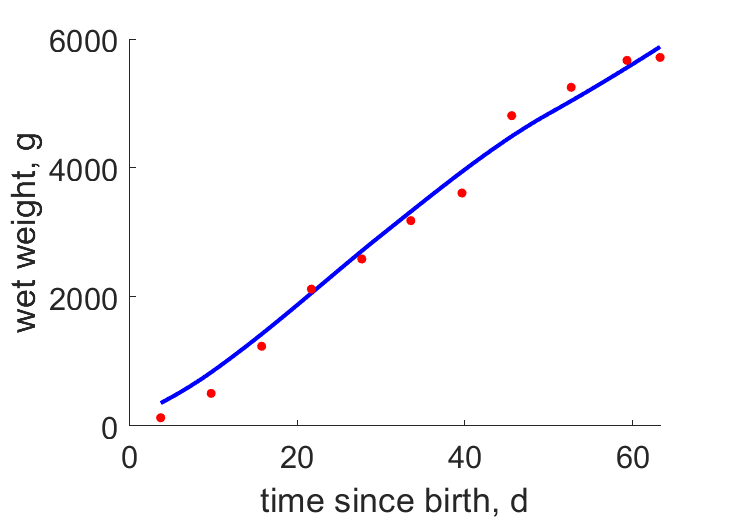Predictions & Data for this entry
| Model: std | climate: ME, MC | migrate: Ml | phylum: |
| COMPLETE = 2.5 | ecozone: MS | food: biCvf, biCic, biCik | class: |
| MRE = 0.020 | habitat: 0iMc | gender: Dg | order: |
| SMSE = 0.001 | embryo: Tncfm | reprod: O | family: |
Zero-variate data
| Data | Observed | Predicted | (RE) | Unit | Description | Reference |
|---|---|---|---|---|---|---|
| ab | 35 | 35.71 | (0.02042) | d | age at birth | ADW |
| tx | 75 | 75.01 | (9.443e-05) | d | time since birth at fledging | ADW |
| tp | 225 | 227 | (0.008955) | d | time since birth at puberty | guess |
| tR | 730 | 730 | ( 0) | d | time since birth at 1st brood | AnAge |
| am | 4745 | 4865 | (0.02522) | d | life span | ADW |
| Wwb | 127 | 127.4 | (0.002813) | g | wet weight at birth | VolkTriv1980 |
| Wwi | 5715 | 5658 | (0.009916) | g | ultimate wet weight | VolkTriv1980 |
| Ri | 0.005479 | 0.005462 | (0.003117) | #/d | maximum reprod rate | ADW |
Uni- and bivariate data
| Data | Figure | Independent variable | Dependent variable | (RE) | Reference |
|---|---|---|---|---|---|
| tW |  | time since birth | wet weight | (0.06348) | VolkTriv1980 |
Pseudo-data at Tref = 20°C
| Data | Generalised animal | Pygoscelis papua | Unit | Description |
|---|---|---|---|---|
| v | 0.02 | 0.03648 | cm/d | energy conductance |
| p_M | 18 | 509.5 | J/d.cm^3 | vol-spec som maint |
| k_J | 0.002 | 0.02054 | 1/d | maturity maint rate coefficient |
| k | 0.3 | 0.2945 | - | maintenance ratio |
| kap | 0.8 | 0.9762 | - | allocation fraction to soma |
| kap_G | 0.8 | 0.8018 | - | growth efficiency |
| kap_R | 0.95 | 0.95 | - | reproduction efficiency |
Discussion
- Embryo energy conducyance is probably much less than the juvenile value
- mod_1: Pseudo-data point k is used, rather than k_J; Data set tp and parameter t_R are added, the latter replacing clutch interval t_N. Postnatal T is based on PrinPres1991, see get_T_Aves. See further the revision page, theme puberty
Bibliography